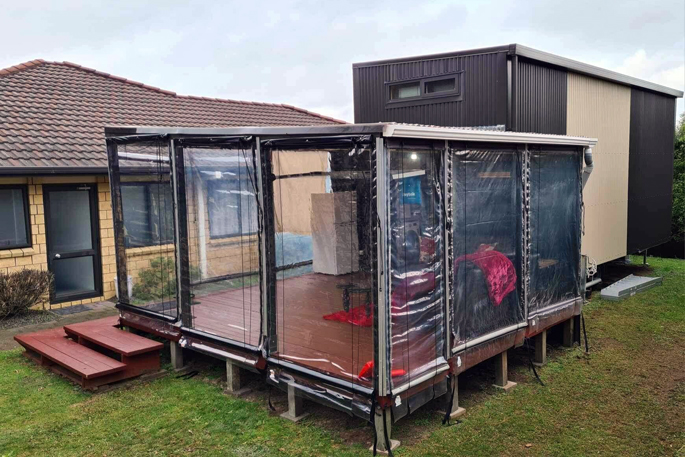A Rotorua bed and breakfast owner says a council plan targeting holiday rental homes “beggars belief” as some hosts face rates increases of 180 per cent.
Rotorua Lakes Council says it’s a “real issue” given Rotorua’s housing shortage and short-term accommodation owners need to pay their “fair share”.
After confusion over how the policy will be applied, the council has acknowledged it could have explained more clearly and says it has had more than 70 queries after sending 912 letters to potentially impacted ratepayers.
The council’s draft Long-Term Plan 2024-24 proposed to charge commercial rates to properties advertised as short-term rentals at least 60 days per year. This previously only applied to such properties occupied at least 100 days a year.
From July 1, hosts will also pay a business and economic development targeted rate under the proposal.
The document estimates the changes could generate $900,000 a year for the council.
It doesn't include other policy criteria but the council has clarified it's aimed at properties used solely for short-term rentals and not homeowners renting part of their home, like a bedroom.
Mayor Tania Tapsell told a public meeting last month it had been difficult to find a balance between casual hosts covering their mortgage and those collecting “very significant profits”.
 Kerris Browne talks about proposed changes for short-term accommodation providers. Photo / Andrew Warner.
Kerris Browne talks about proposed changes for short-term accommodation providers. Photo / Andrew Warner.
But Rotorua host Kerris Browne tells Local Democracy Reporting she doesn't believe this balance was struck.
She hosts guests in the four spare bedrooms of her family home, as well as a detached tiny home in the backyard.
After she received a notification letter and queried the new policy, she says she learned at a public meeting it was her tiny home that made her property eligible for commercial rates.
Kerris says the space, which has a kitchen and toilet, was occupied for 37 per cent of nights in the 12 months to April.
“And for that I’m going to pay an extra $5000 a year.”
Kerris’ property’s rates will increase 103.67 per cent to a total of $8658.83 excluding GST. Others in the district Local Democracy Reporting found face a 187 per cent rise, totalling more than $20,000 for one.
She says being rated as a commercial property “beggars belief” and she can't see how what she does compares to commercial premises.
“We don’t mind the empty months, as this is only our top-up to help the mortgage, not a commercial entity.”
Hosts like herself offer tourists a different experience to motels, she says, and provide a “backup” during busy periods when other visitor accommodation is scarce.
Rotorua’s commercial short-term accommodation occupancy rates range from 44.6 per cent in July to 68.8 per cent in January, according to the latest Ministry of Business, Innovation, and Employment data.
If the policy goes ahead, the tiny home will stay empty as she says it's not compliant with the Residential Tenancies Act for long-term living, and a full-time renter will mean too much noise, mess and lost privacy for her family.
She believes many hosts will be in the same situation.
Kerris says homes should be assessed case-by-case, such as through a resource consent process.
 Rotorua Lakes Council corporate services group manager Thomas Collé. Photo / Laura Smith.
Rotorua Lakes Council corporate services group manager Thomas Collé. Photo / Laura Smith.
Council corporate service group manager Thomas Collé says council research found more than 1000 properties in the district are advertised for short-term accommodation, down from 1200-1300 prior to the pandemic.
“[The proposal] raises the question of fairness and equity and whether owners of properties offering short-term accommodation are paying their fair share towards the district and tourism promotion compared to traditional accommodation providers like motels, hotels and campgrounds.”
He says they benefit from tourism marketing of Rotorua funded by commercial rates.
Collé says 30, 60 and 90 advertised days are considered for the proposal.
“We also looked at what other councils are doing. For instance, Queenstown has a voluntary registration system and applies different rates based on how properties are used.”
He says the proposal intends to find a fair approach to distinguish between homes used mostly for family living but occasionally advertised for short stays, and those solely used for commercial purposes.
“Homeowners that rent only part of their home, like one room, won’t be included and were never intended to be.
“But those using properties solely for short-term rentals would be treated as commercial…”
He says ratepayers who received a letter about the economic development rate and don't believe they fit the criteria should contact the council.
As of Friday, it was dealing with 70 enquiries.
“We have a high degree of confidence in the 912 letters sent but expect it may ultimately be fewer as we receive more information from property owners.”
 Kerris Browne's tiny home visitor rental in her backyard.
Kerris Browne's tiny home visitor rental in her backyard.
Local Democracy Reporting asked why the draft plan did not include more detail about how the policy would be applied and to who.
Collé says the consultation document was intended to provide a summary of proposals, but accepts it could have been clearer.
“Property owners who received letters were invited to an information session regarding the proposal which enabled us to provide more detail.
“They have the opportunity to discuss their situation with us so that we can confirm with them whether the proposed rate would apply to them.”
If the policy is adopted, the rating information database for all properties in the district will be updated by June 30.
This database will determine whether a property is residential or commercial for the following year, effective from July 1.
If a property owner stops providing short-term accommodation during the year, their rate cannot be reset until the next update.
Once a rate is set, it cannot be adjusted unless there was an error. If the proposed policy is adopted and ratepayers plan to stop providing short-term accommodation before July 1, they will need to notify the council before July 1.
Consultation on the draft plan ends on May 10.
LDR is local body journalism co-funded by RNZ and NZ On Air.




7 comments
Excellent! Fantastic!
Posted on 07-05-2024 08:19 | By Bruja
Houses should be for people to LIVE IN, permanently. Kids can then go to the same school for longer than a term. They can make friendships and have a neighbourhood. Get the 'air bnbs' gone!!! Hotels, motels and camping grounds only for 'holiday accommodation'.
Queenstown and Mount Maunganui next. Bring it on!
It’s a business and income
Posted on 07-05-2024 08:31 | By Naysay
Your operating a business in your home and generating income through same as a hotel but without compliance of health and safety. I guess you are operating without consents of your neighbours. What must that be like for them ?
In Australia you need to apply for a licence which is renewed every year and compliance is required as it approval from neighbours.
Pay your way !
Great idea bring it to Tauranga .
Not A Business
Posted on 07-05-2024 08:35 | By Alfa male
If you are renting out your property for profit then it is a business and should be treated as one, whether that be for council rates or any other applicable taxes.
Good.
Posted on 07-05-2024 08:58 | By jed
They are accommodation businesses, so should be bound by the same rules as hotels and so on.
Generally I'm opposed to airbnb homes anyway. They're very disruptive and out of character for residential zoning. The B&B model is fine, as the owner is there to monitor guest behaviour.
The Master
Posted on 07-05-2024 12:29 | By Ian Stevenson
Another rouge Council plan to steal monies ex ratepayers.
When will a council address its wasteful spending before aggressively attacking ratepayers?
Say what!
Posted on 07-05-2024 14:24 | By Come on TCC!
This sounds like the council is jumping into someone else's business and helping them selves to their profits?
The government has made it unviable to supply rental accommodation noe the council is doing the same for holiday rentals?
Don't they want the tourists dollars?
Onbe of the BIGGEST reasons for homelessness
Posted on 08-05-2024 14:54 | By Bruja
in this country is 'air bnb' type rentals. Greedy short-term gains by a few that keep Kiwi families in run-down motels. Get these 'businesses' stopped!
HOMES FOR KIWI RESIDENTS NOT TOURISTS!!!
Leave a Comment
You must be logged in to make a comment.